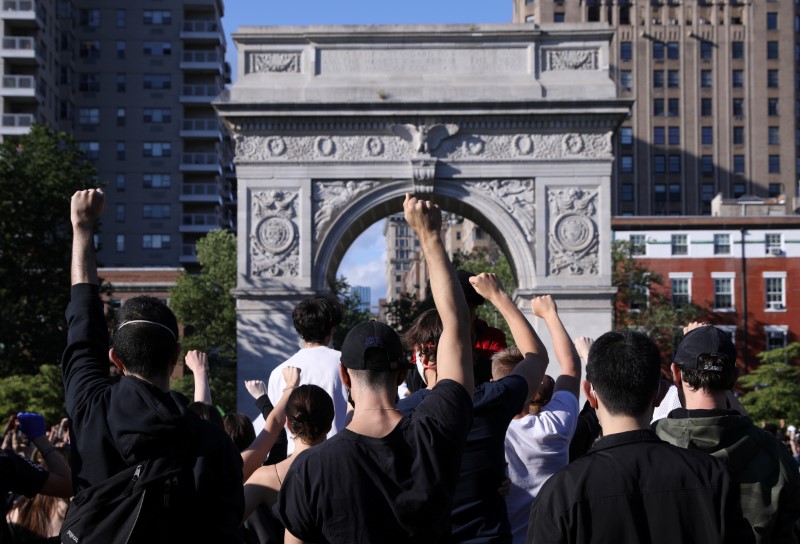By Jan Wolfe
(Reuters) - U.S. President Donald Trump on Monday suggested he would use federal troops to end unrest that has erupted following the death of George Floyd, an unarmed black man killed in police custody last week.
"If a city or state refuses to take the actions that are necessary to defend the life and property of their residents, then I will deploy the United States military and quickly solve the problem for them," Trump said during brief remarks at the White House.
The demonstrations have been largely peaceful, but police in some cities have used force against journalists and protesters, and protesters have clashed with police. Many U.S. cities have set curfews.
To deploy the armed forces, Trump would need to formally invoke a group of statutes known as the Insurrection Act.
WHAT IS THE INSURRECTION ACT?
Under the U.S. Constitution, governors generally have the authority to maintain order within state borders. This principle is reflected in a law called the Posse Comitatus Act, which generally prohibits the federal military from participating in domestic law enforcement.
The Insurrection Act, which dates to the early 1800s, is an as exception to principles later codified in the Posse Comitatus Act.
The Insurrection Act permits the president to send in U.S. forces to suppress a domestic insurrection that has hindered the normal enforcement of U.S. law.
CAN TRUMP SEND IN TROOPS WITHOUT A GOVERNOR'S APPROVAL?
Yes. The law lays out a scenario in which the president is required to have approval from a state's governor or legislature, and also instances where such approval is not necessary, said Robert Chesney, a professor of national security law at the University of Texas.
Historically, in instances where the Insurrection Act was invoked, presidents and governors have usually agreed on the need for troops, said Thaddeus Hoffmeister, a law professor at the University of Dayton.
In 2005, former President George W. Bush decided not to invoke the Insurrection Act to send active-duty troops to Louisiana in the aftermath of Hurricane Katrina in part because the state's then-governor opposed the move.
HAS IT BEEN INVOKED BEFORE?
Yes. The Insurrection Act has been invoked on dozens of occasions through U.S. history. Since the civil rights movement of the 1960s, however, its use has become "exceedingly rare," according to a report by the Congressional Research Service.
The Insurrection Act was last used in 1992, when the acquittal of four Los Angeles police officers in the beating of black motorist Rodney King led to deadly riots.
CAN A COURT STRIKE DOWN TRUMP'S APPLICATION OF THE LAW?
Hoffmeister said he did not think invoking the Insurrection Act was warranted because governors can handle the current unrest through their criminal justice systems.
"The Insurrection Act should only be used in dire situations and I don't think the circumstances right now call for it," Hoffmeister said.
But Chesney said a successful legal challenge to Trump's use of the law was "very unlikely." Courts have historically been very reluctant to second-guess a president's military declarations, he said.
"The law, for all practical purposes, leaves this to the president with very little judicial review with any teeth," Chesney said. "That may be a terrible state of affairs, but that's what it is."
